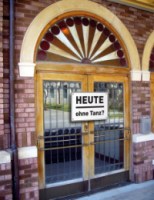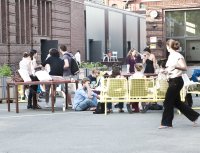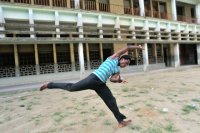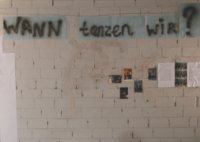NEGOTIATING CONDITIONS

© Steffen Klaiber
Under what conditions is dance conveyed, produced and presented on a local, national, and global level? In addition to the debate on the status of dance for cultural policies in municipalities and federal states, this thematic block is dedicated to both the programme policies in exchange projects between Europe and Africa and networks of cross-cultural dance production initiated by artists beyond state funding. Further events deal with the future of repertory companies and the promotion of emerging artists. Dance institutions such as the tanzhaus nrw are explored as social and architectural structures and dance festivals are examined in regard to their representation of cultural differences.
Fri, 7 June 15:00
-
15:00 - 16:45 tanzhaus, Studio 4
The Value of Dance
How should we define the value of dance in the arts and society? Are there ways to implement distinct structural enhancements? Arts Councils and national dance institutions are asked to mediate between artists, audience and policy makers in order to attract the attention and visibility the dance deserves. Exemplary international dance professionals in the field of promoting dance present their strategies on how they are making the case for dance in their respective countries. Short inputs will be followed by a wider discussion. How can we better negotiate conditions for dance to develop in our countries but also on a transnational level?
With Arts Council England, Centre National de la Danse, Institute of Music and Dance Poland, Dance UK, Reso-Tanznetzwerk Schweiz, Vlaams Theater Instituut, World Dance Alliance, Tanzfonds and others
Fri, 7 June 18:00
-
18:00 - 19:30 Capitol, Club Video
New Paths in Funding Dance
In Germany, dance is produced in an enormous diversity, yet it remains barely visible. Productions at permanent houses can often only be viewed locally, rarely do independent projects result in independent companies. What is lacking is flexibility on the one side and continuity on the other. While the artists are already working nationally and internationally, cultural policies still think in delimited spheres: the city, the state, the permanent theatre, the independent scene. Why don’t politicians develop a type of dance promotion that connects cities, states and the federal state with each other? And who should take the initiative?
Reiner Deutschmann (D) cultural-political speaker FDP
Hans-Georg Küppers (D) head of the department of the City of Munich
Bertram Müller (D) Dachverband Tanz
Ute Schäfer (D) minister for culture Land NRW, SPD
Hortensia Völckers (D) artistic director German Federal Cultural Foundation
Short statements:
Gregor Zöllig (D) choreographer, director Tanztheater, Theater Bielefeld
Stefanie Thiersch (D), Helena Waldmann (D) choreographers
Moderation:
Tobi Müller (D) journalist
Concept:
Michael Freundt (D) Dachverband Tanz Deutschland
Sat, 8 June 10:00
-
10:00 - 12:45 tanzhaus, Studio 5
Entry and Exit
Crossing the Borders of “Emerging”
 © Uferstudios
© UferstudiosHow does one gain the status of an “emerging artist”, an artist at the start of his or her career, and what defines it? One’s age, training qualification, work experience, the amount of professional fees? Can the label “artistic hope” actually boost one’s career? And if not, how does one get rid of it again? This lab initiates a discussion on promotion guidelines and programme formats between students about to take their first steps into the professional dance market and choreographers who have acquired personal experiences with formats for young artists. The results of their stocktaking will be included in the lab ‘Emerging Artists: Between Dance Training and Dance Market’.
Registrations can be made at the Info Counter in the Congress Venue
Concept/moderation:
Kerstin Evert (D) director K3 – Zentrum für Choreografie
Matthias Quabbe (D) dramaturge K3 – Zentrum für Choreografie
Gabi Beier (D) artistic director ada Studio
Mareike Uhl (D) project management Tanzlabor_21
Sat, 8 June 12:00
-
12:00 - 12:45 Capitol, Club Video
Marketing the Local in a Global Economy
At international dance festivals, national identities, local affiliations, and global economic concerns meet. The cultural theorist Janet O‘Shea compares the spectacular Festival of India with the initially grassroots, localised London festival Dance Umbrella. She asks whether it is possible to offer a kind of political resistance through festival programming. At the intersections of the local and international levels, festivals are extremely difficult, diplomatic balancing acts. Their possibilities to present cultural differences decisively depend on current immigration policies.
Janet O‘Shea (USA) cultural theorist
Sat, 8 June 14:00
-
14:00 - 14:45 Capitol, Theatersaal Video
Dance or Die
Tilts and Moves in Contemporary Dance
Artists such as Akram Khan, Sidi Larbi Cherkaoui, Faustin Linyekula, Monika Gintersdorfer, and Gregory Maqoma pursue a politics of deterritorialisation and collaboration. They establish networks beyond state funding policies and simultaneously work together with national foundations, festivals and funding institutions. In an overall climate of global economic crisis, contemporary dance thus becomes a model for a mode of production that not only preserves cultural peculiarities but also develops new, viable forms of collaboration. Do such modes of practice actually facilitate the global redistribution of symbolic capital or do they merely serve the cliché of a “good” globalisation?
Sabine Sörgel (D/UK) theatre scholar
Sat, 8 June 15:00
-
15:00 - 18:00 tanzhaus, Studio 1
Backstage
Spaces, (Hi)Stories of tanzhaus nrw
On the occasion of tanzhaus nrw’s 35th anniversary and the coming change of artistic direction, students of the Centre for Contemporary Dance (ZZT) in Cologne conduct interviews with members of the executive team and teachers of the Tanzakademie at tanzhaus nrw. The live interviews deal with topics such as the relevance of the team members for the institution’s profile, their commitment to cultural diversity and social inclusion as well as their personal thoughts in a phase of institutional change. The talks with Bertram Müller, Angela Vucko, Dorothee Schackow, Jost Budde, Takao Baba and Carlo Melis can be followed via headphones and are supplemented by an audio-walk through unknown spaces of tanzhaus nrw during the opening night of the congress.
In German
Concept:
Pirkko Husemann (D) theatre scholar, dance dramaturge
Katarina Kleinschmidt (D) dance scholar, dancer
Assistance:
Yvonne Franke (D) student ZZT
By/with:
Tina Berger, Philine Herrlein, Valerie Kommer, Sebastian Krekow, Hannah Nürnberg, Antonia Steffens (D) students at Zentrum für Zeitgenössischen Tanz der Hochschule für Musik und Tanz Köln
Sat, 8 June 16:00
-
16:00 - 17:30 Capitol, Studio
Cultural Policies in the Post-Colony
 © Elise Fitte-Duval
© Elise Fitte-DuvalEuropean organisations, sponsors and organisers support African dance production with resources and residencies, artistic exchange projects or festivals for African dance in Africa and Europe. What motivates this cultural “development policy” under postcolonial conditions and what are its (positive and negative) effects? Are the existing programmes and networks at all geared to the actual needs? What production and presentation alternatives are being developed locally and globally on the side of the artists and what alternatives already exist?
Panaibra Gabriel Canda (MZ), Koffi Kôkô (F/BJ), Faustin Linyekula (CGO/F), Stephanie Thiersch (D) choreographers
Laurent Van Kote (F) Ministère de la Culture et de la Communication
Marc-André Schmachtel (D) Goethe-Institut Nigeria
Stefan Schwarz (D) tanzhaus nrw, Dance Dialogues AfricaModeration:
Sabine Sörgel (D/UK) theatre scholar
Sat, 8 June 18:00
-
18:00 - 19:30 Capitol, Club Video
The Renaissance of Dance Cities
Dance is an important part of a city’s cultural life. Professional artistic dance reflects the cultural diversity of a society and its currently relevant themes. Moreover, dance is increasingly taking on social, pedagogical and therapeutic tasks. And it counts as a successful centre of attraction for the tourism industry. However, these positive influences are hardly perceived by the public. Politicians and artists on the podium discuss the conditions of choreographic work in municipalities and examine the status of dance in present-day concepts of city development.
Barbara Kisseler (D) Culture Senator Hamburg
Jörg Mannes (D) ballet director Staatsoper Hannover
Hans-Bernhard Nordhoff (D) cultural consultant, former head of the department of culture Frankfurt/M.
Sabrina Sadowska (D) deputy ballet director Theater Vorpommern
Holger Schultze (D) director Theater und Orchester Heidelberg
Anna Vita (D) ballet director Theater Würzburg
Moderation:
Claudia Henne (D) editor rbb
Concept:
BBTK/Bundesdeutsche Ballett- und Tanztheaterdirektoren Konferenz
Sun, 9 June 10:00
-
10:00 - 12:00 tanzhaus, Studio 1
Emerging Artists
Between Dance Training and Dance Market
 © Matthias Quabbe
© Matthias QuabbeIn the past years, numerous training courses for choreography, dance, dance mediation, and performance have been developed. The graduates are faced with a contemporary “dance market” in which the most various formats have emerged to enable the entry into the market. But are the training courses and the dance market tuned to each other? Do they complement each other – or are they possibly diametrically opposed? What does an independent production system, what do municipal and state theatres expect from young artists? Does postsecondary training take these expectations into consideration? Is “too much” training taking place?
Nik Haffner (D) choreographer, lecturer Hochschulübergreifendes Zentrum Tanz Berlin
Joanna Lešnierowska (PL) curator, dramaturge, critic Adam Mickiewicz University Poznań
Bettina Masuch (D) curator Tanz im August
Jan Pusch (D) choreographer Theater BraunschweigModeration:
Gabriele Naumann-Maerten (D) cultural manager -
10:00 - 12:00 Capitol, Studio
Mindmap
First Hour of a Handbook for Politics
On the level of municipalities and federal states, the promotion of art belongs to the so-called voluntary services. If the administration makes budget cuts, culture and therefore particularly dance are the first to be affected. What can a handbook for advising and enlightening community and state politicians look like, so that dance will become an indispensable component of the promotion of culture and remain firmly anchored in the agenda? With the aim of making dance tangible and comprehensible for politics, this lab invites participants to creatively work on the contents for a kind of “guide” on the art form of dance.
In German
With guests from the world of politics and dance
Moderation:
Arnd Wesemann (D) journalist, editor tanz
Concept:
BBTK/Bundesdeutsche Ballett- und Tanztheaterdirektoren Konferenz
Sun, 9 June 11:00
-
11:00 - 13:00 tanzhaus, Studio 5
RepNet Creates Debate:
Redefining Repertory Companies?
As opposed to flexible models of work in the independent scene, repertory companies at first glance appear as static entities. What function – and what future – can companies with their own ensemble and a fixed canon of pieces have in an increasingly globalised world of dance? What are their specific strengths and weaknesses in creation and production? And not least: How can an artistic identity be forged without a permanent choreographer? Following the motto “share and learn”, the RepNet network invites choreographers, dancers, curators, cultural managers, and cultural policy makers to a round-table discussion.
RepNet is an international network founded in 2008 by five repertory companies – Carte Blanche (N), Iceland Dance Company (IS), Scottish Dance Theatre (UK), Skånes Dansteater (S), Tanzcompagnie Oldenburg (D) – with the aim of regularly and jointly providing further training for the members of their companies, as well as discussing issues related to cultural policies and triggering public debates.Honne Dohrmann (D) Direktor Tanzcompagnie Oldenburg
Bruno Heynderickx (N) artistic director Carte Blanche
Meinrad Huber (D) dance agent ecotopia dance productions
Lára Stefansdóttir (IS) dancer, choreographer
Jo Strømgren (N) choreographer Jo Strømgren KompaniConcept/support:
RepNet